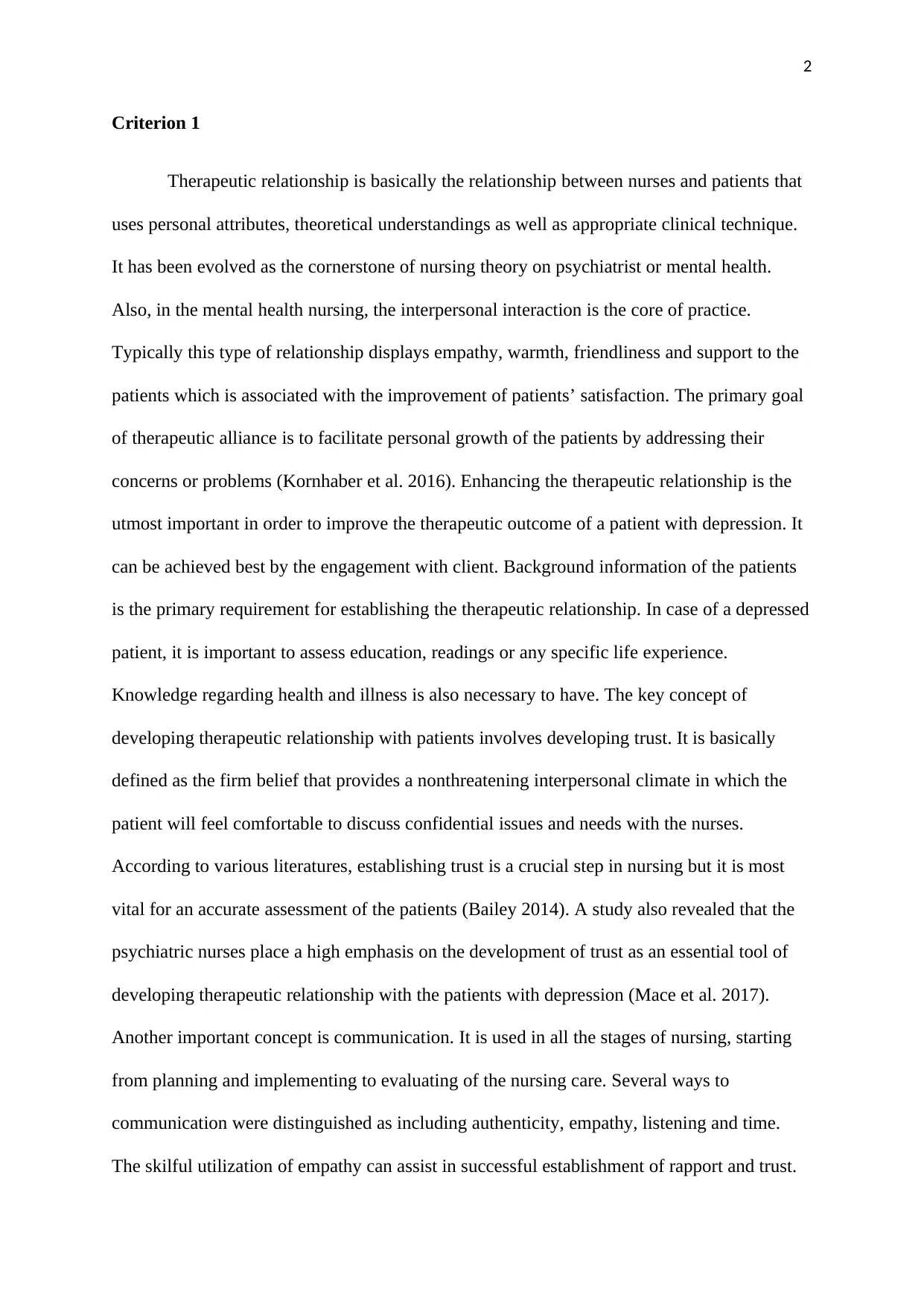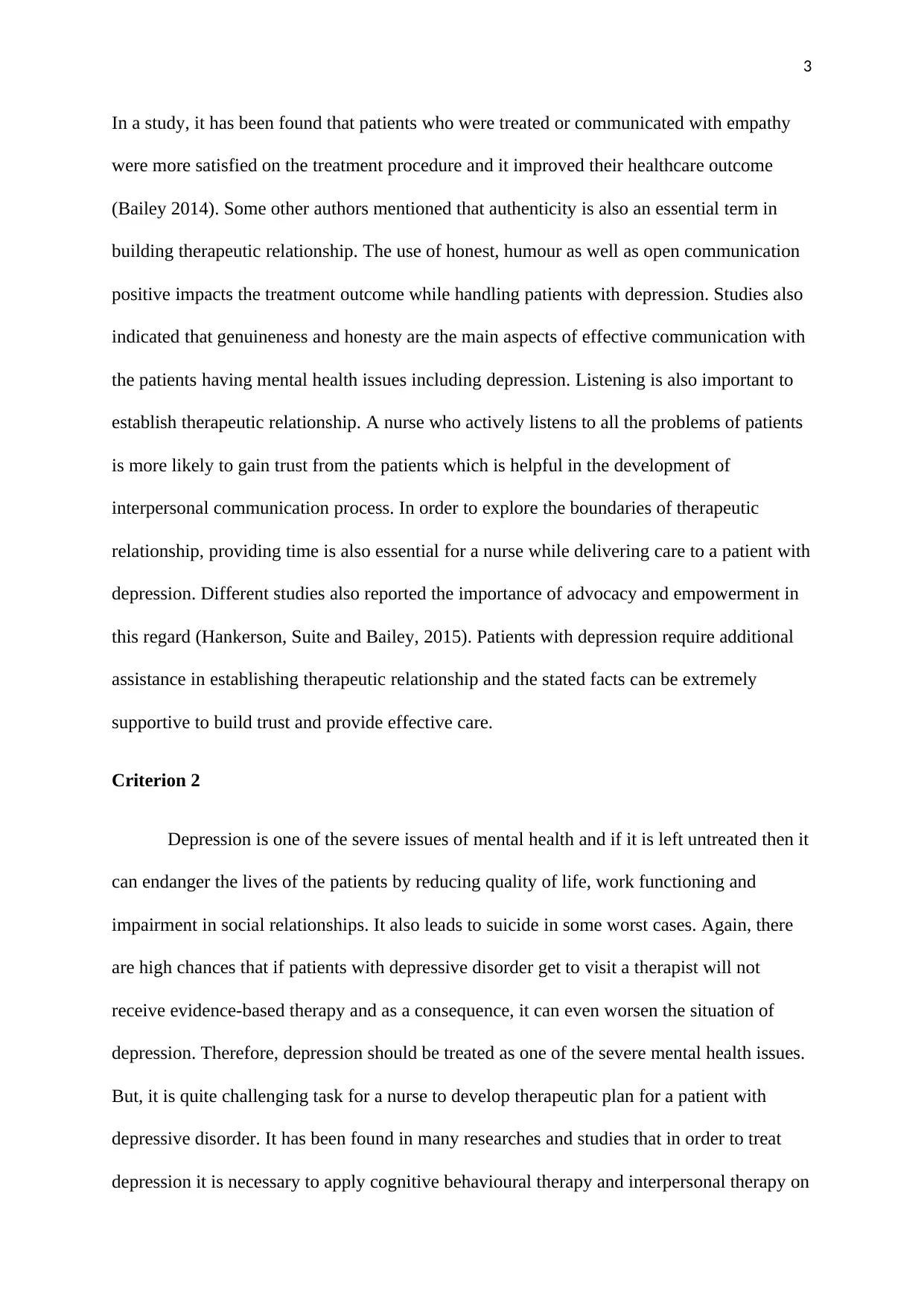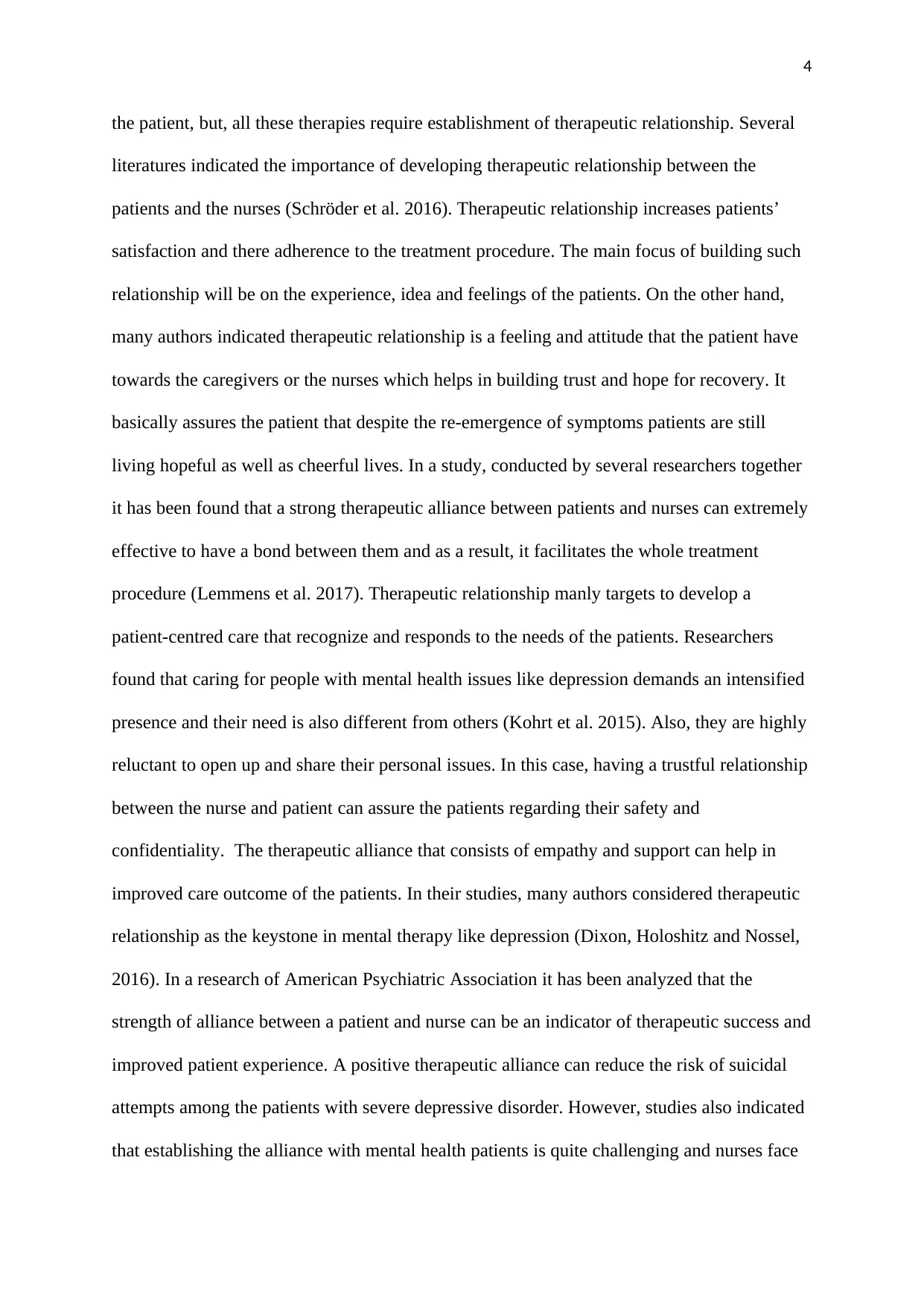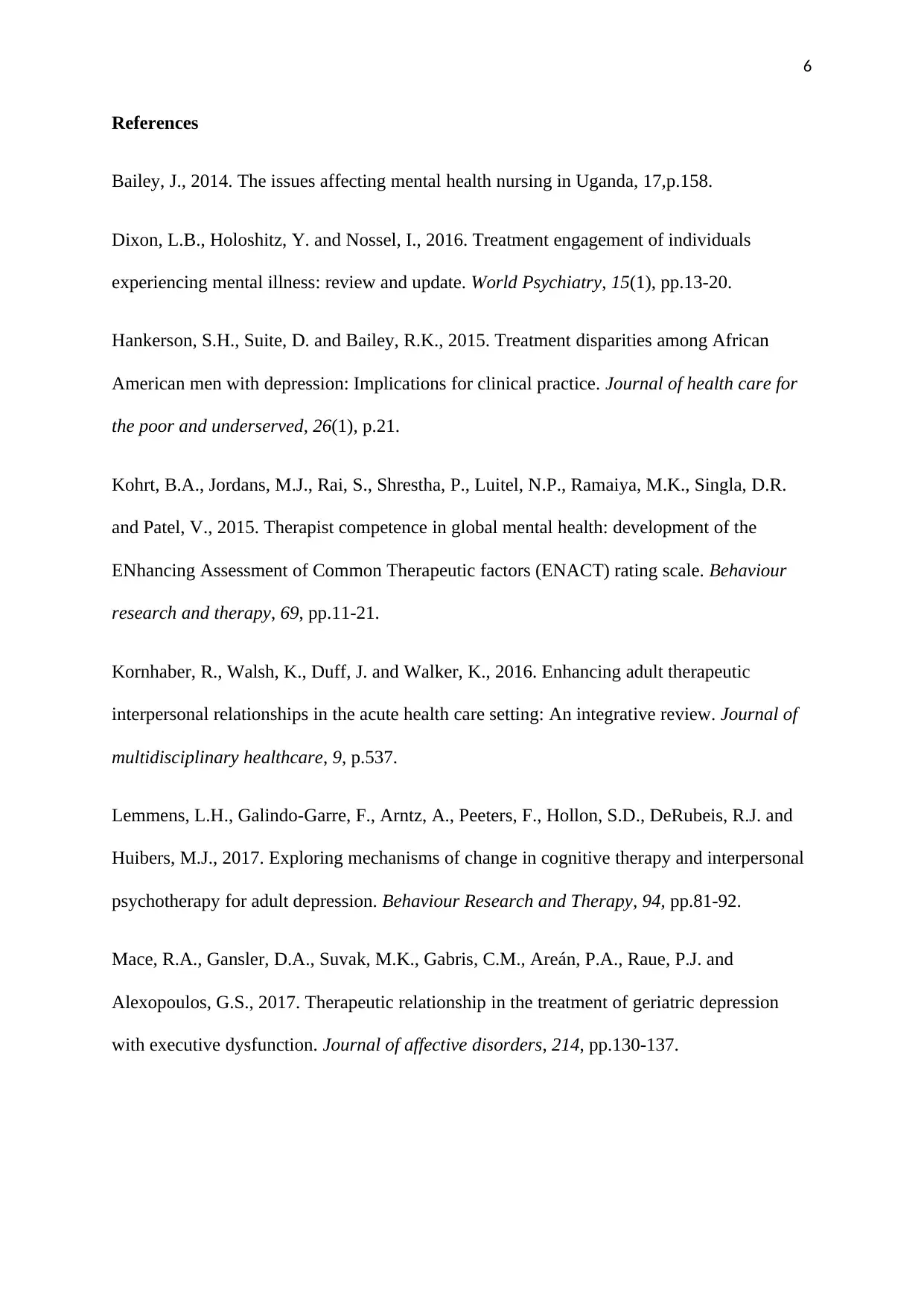Therapeutic Relationships and Depression in Mental Health Nursing
VerifiedAdded on 2022/12/29
|7
|1536
|97
Report
AI Summary
This report examines the critical role of therapeutic relationships in mental health nursing, particularly in the context of patients with depression. It emphasizes that therapeutic relationships, built on trust, empathy, and effective communication, are fundamental to successful patient care and treatment outcomes. The report explores how nurses establish these relationships by understanding patients' backgrounds, utilizing active listening, and providing a supportive environment. The report also highlights the importance of these relationships in addressing the challenges associated with depression, such as treatment adherence and the potential for suicidal ideation. It underscores that a strong therapeutic alliance is key to patient satisfaction and improved mental health outcomes, referencing supporting literature and evidence. The report further explains the significance of cognitive behavioral therapy and interpersonal therapy, and how they require the establishment of a therapeutic relationship. Finally, the report concludes that despite the challenges, building therapeutic alliances is essential for providing quality care to patients with depression.

1
Title
Student’s name
Student’s id
Title
Student’s name
Student’s id
Paraphrase This Document
Need a fresh take? Get an instant paraphrase of this document with our AI Paraphraser

2
Criterion 1
Therapeutic relationship is basically the relationship between nurses and patients that
uses personal attributes, theoretical understandings as well as appropriate clinical technique.
It has been evolved as the cornerstone of nursing theory on psychiatrist or mental health.
Also, in the mental health nursing, the interpersonal interaction is the core of practice.
Typically this type of relationship displays empathy, warmth, friendliness and support to the
patients which is associated with the improvement of patients’ satisfaction. The primary goal
of therapeutic alliance is to facilitate personal growth of the patients by addressing their
concerns or problems (Kornhaber et al. 2016). Enhancing the therapeutic relationship is the
utmost important in order to improve the therapeutic outcome of a patient with depression. It
can be achieved best by the engagement with client. Background information of the patients
is the primary requirement for establishing the therapeutic relationship. In case of a depressed
patient, it is important to assess education, readings or any specific life experience.
Knowledge regarding health and illness is also necessary to have. The key concept of
developing therapeutic relationship with patients involves developing trust. It is basically
defined as the firm belief that provides a nonthreatening interpersonal climate in which the
patient will feel comfortable to discuss confidential issues and needs with the nurses.
According to various literatures, establishing trust is a crucial step in nursing but it is most
vital for an accurate assessment of the patients (Bailey 2014). A study also revealed that the
psychiatric nurses place a high emphasis on the development of trust as an essential tool of
developing therapeutic relationship with the patients with depression (Mace et al. 2017).
Another important concept is communication. It is used in all the stages of nursing, starting
from planning and implementing to evaluating of the nursing care. Several ways to
communication were distinguished as including authenticity, empathy, listening and time.
The skilful utilization of empathy can assist in successful establishment of rapport and trust.
Criterion 1
Therapeutic relationship is basically the relationship between nurses and patients that
uses personal attributes, theoretical understandings as well as appropriate clinical technique.
It has been evolved as the cornerstone of nursing theory on psychiatrist or mental health.
Also, in the mental health nursing, the interpersonal interaction is the core of practice.
Typically this type of relationship displays empathy, warmth, friendliness and support to the
patients which is associated with the improvement of patients’ satisfaction. The primary goal
of therapeutic alliance is to facilitate personal growth of the patients by addressing their
concerns or problems (Kornhaber et al. 2016). Enhancing the therapeutic relationship is the
utmost important in order to improve the therapeutic outcome of a patient with depression. It
can be achieved best by the engagement with client. Background information of the patients
is the primary requirement for establishing the therapeutic relationship. In case of a depressed
patient, it is important to assess education, readings or any specific life experience.
Knowledge regarding health and illness is also necessary to have. The key concept of
developing therapeutic relationship with patients involves developing trust. It is basically
defined as the firm belief that provides a nonthreatening interpersonal climate in which the
patient will feel comfortable to discuss confidential issues and needs with the nurses.
According to various literatures, establishing trust is a crucial step in nursing but it is most
vital for an accurate assessment of the patients (Bailey 2014). A study also revealed that the
psychiatric nurses place a high emphasis on the development of trust as an essential tool of
developing therapeutic relationship with the patients with depression (Mace et al. 2017).
Another important concept is communication. It is used in all the stages of nursing, starting
from planning and implementing to evaluating of the nursing care. Several ways to
communication were distinguished as including authenticity, empathy, listening and time.
The skilful utilization of empathy can assist in successful establishment of rapport and trust.

3
In a study, it has been found that patients who were treated or communicated with empathy
were more satisfied on the treatment procedure and it improved their healthcare outcome
(Bailey 2014). Some other authors mentioned that authenticity is also an essential term in
building therapeutic relationship. The use of honest, humour as well as open communication
positive impacts the treatment outcome while handling patients with depression. Studies also
indicated that genuineness and honesty are the main aspects of effective communication with
the patients having mental health issues including depression. Listening is also important to
establish therapeutic relationship. A nurse who actively listens to all the problems of patients
is more likely to gain trust from the patients which is helpful in the development of
interpersonal communication process. In order to explore the boundaries of therapeutic
relationship, providing time is also essential for a nurse while delivering care to a patient with
depression. Different studies also reported the importance of advocacy and empowerment in
this regard (Hankerson, Suite and Bailey, 2015). Patients with depression require additional
assistance in establishing therapeutic relationship and the stated facts can be extremely
supportive to build trust and provide effective care.
Criterion 2
Depression is one of the severe issues of mental health and if it is left untreated then it
can endanger the lives of the patients by reducing quality of life, work functioning and
impairment in social relationships. It also leads to suicide in some worst cases. Again, there
are high chances that if patients with depressive disorder get to visit a therapist will not
receive evidence-based therapy and as a consequence, it can even worsen the situation of
depression. Therefore, depression should be treated as one of the severe mental health issues.
But, it is quite challenging task for a nurse to develop therapeutic plan for a patient with
depressive disorder. It has been found in many researches and studies that in order to treat
depression it is necessary to apply cognitive behavioural therapy and interpersonal therapy on
In a study, it has been found that patients who were treated or communicated with empathy
were more satisfied on the treatment procedure and it improved their healthcare outcome
(Bailey 2014). Some other authors mentioned that authenticity is also an essential term in
building therapeutic relationship. The use of honest, humour as well as open communication
positive impacts the treatment outcome while handling patients with depression. Studies also
indicated that genuineness and honesty are the main aspects of effective communication with
the patients having mental health issues including depression. Listening is also important to
establish therapeutic relationship. A nurse who actively listens to all the problems of patients
is more likely to gain trust from the patients which is helpful in the development of
interpersonal communication process. In order to explore the boundaries of therapeutic
relationship, providing time is also essential for a nurse while delivering care to a patient with
depression. Different studies also reported the importance of advocacy and empowerment in
this regard (Hankerson, Suite and Bailey, 2015). Patients with depression require additional
assistance in establishing therapeutic relationship and the stated facts can be extremely
supportive to build trust and provide effective care.
Criterion 2
Depression is one of the severe issues of mental health and if it is left untreated then it
can endanger the lives of the patients by reducing quality of life, work functioning and
impairment in social relationships. It also leads to suicide in some worst cases. Again, there
are high chances that if patients with depressive disorder get to visit a therapist will not
receive evidence-based therapy and as a consequence, it can even worsen the situation of
depression. Therefore, depression should be treated as one of the severe mental health issues.
But, it is quite challenging task for a nurse to develop therapeutic plan for a patient with
depressive disorder. It has been found in many researches and studies that in order to treat
depression it is necessary to apply cognitive behavioural therapy and interpersonal therapy on
⊘ This is a preview!⊘
Do you want full access?
Subscribe today to unlock all pages.

Trusted by 1+ million students worldwide

4
the patient, but, all these therapies require establishment of therapeutic relationship. Several
literatures indicated the importance of developing therapeutic relationship between the
patients and the nurses (Schröder et al. 2016). Therapeutic relationship increases patients’
satisfaction and there adherence to the treatment procedure. The main focus of building such
relationship will be on the experience, idea and feelings of the patients. On the other hand,
many authors indicated therapeutic relationship is a feeling and attitude that the patient have
towards the caregivers or the nurses which helps in building trust and hope for recovery. It
basically assures the patient that despite the re-emergence of symptoms patients are still
living hopeful as well as cheerful lives. In a study, conducted by several researchers together
it has been found that a strong therapeutic alliance between patients and nurses can extremely
effective to have a bond between them and as a result, it facilitates the whole treatment
procedure (Lemmens et al. 2017). Therapeutic relationship manly targets to develop a
patient-centred care that recognize and responds to the needs of the patients. Researchers
found that caring for people with mental health issues like depression demands an intensified
presence and their need is also different from others (Kohrt et al. 2015). Also, they are highly
reluctant to open up and share their personal issues. In this case, having a trustful relationship
between the nurse and patient can assure the patients regarding their safety and
confidentiality. The therapeutic alliance that consists of empathy and support can help in
improved care outcome of the patients. In their studies, many authors considered therapeutic
relationship as the keystone in mental therapy like depression (Dixon, Holoshitz and Nossel,
2016). In a research of American Psychiatric Association it has been analyzed that the
strength of alliance between a patient and nurse can be an indicator of therapeutic success and
improved patient experience. A positive therapeutic alliance can reduce the risk of suicidal
attempts among the patients with severe depressive disorder. However, studies also indicated
that establishing the alliance with mental health patients is quite challenging and nurses face
the patient, but, all these therapies require establishment of therapeutic relationship. Several
literatures indicated the importance of developing therapeutic relationship between the
patients and the nurses (Schröder et al. 2016). Therapeutic relationship increases patients’
satisfaction and there adherence to the treatment procedure. The main focus of building such
relationship will be on the experience, idea and feelings of the patients. On the other hand,
many authors indicated therapeutic relationship is a feeling and attitude that the patient have
towards the caregivers or the nurses which helps in building trust and hope for recovery. It
basically assures the patient that despite the re-emergence of symptoms patients are still
living hopeful as well as cheerful lives. In a study, conducted by several researchers together
it has been found that a strong therapeutic alliance between patients and nurses can extremely
effective to have a bond between them and as a result, it facilitates the whole treatment
procedure (Lemmens et al. 2017). Therapeutic relationship manly targets to develop a
patient-centred care that recognize and responds to the needs of the patients. Researchers
found that caring for people with mental health issues like depression demands an intensified
presence and their need is also different from others (Kohrt et al. 2015). Also, they are highly
reluctant to open up and share their personal issues. In this case, having a trustful relationship
between the nurse and patient can assure the patients regarding their safety and
confidentiality. The therapeutic alliance that consists of empathy and support can help in
improved care outcome of the patients. In their studies, many authors considered therapeutic
relationship as the keystone in mental therapy like depression (Dixon, Holoshitz and Nossel,
2016). In a research of American Psychiatric Association it has been analyzed that the
strength of alliance between a patient and nurse can be an indicator of therapeutic success and
improved patient experience. A positive therapeutic alliance can reduce the risk of suicidal
attempts among the patients with severe depressive disorder. However, studies also indicated
that establishing the alliance with mental health patients is quite challenging and nurses face
Paraphrase This Document
Need a fresh take? Get an instant paraphrase of this document with our AI Paraphraser

5
several difficulties in this regard (Kornhaber et al. 2016). But, with some proper strategies
and implementations it is possible. Moreover, empathy is the most essential term to build
therapeutic relationship in order to deliver the best quality care to the patients with
depression.
several difficulties in this regard (Kornhaber et al. 2016). But, with some proper strategies
and implementations it is possible. Moreover, empathy is the most essential term to build
therapeutic relationship in order to deliver the best quality care to the patients with
depression.

6
References
Bailey, J., 2014. The issues affecting mental health nursing in Uganda, 17,p.158.
Dixon, L.B., Holoshitz, Y. and Nossel, I., 2016. Treatment engagement of individuals
experiencing mental illness: review and update. World Psychiatry, 15(1), pp.13-20.
Hankerson, S.H., Suite, D. and Bailey, R.K., 2015. Treatment disparities among African
American men with depression: Implications for clinical practice. Journal of health care for
the poor and underserved, 26(1), p.21.
Kohrt, B.A., Jordans, M.J., Rai, S., Shrestha, P., Luitel, N.P., Ramaiya, M.K., Singla, D.R.
and Patel, V., 2015. Therapist competence in global mental health: development of the
ENhancing Assessment of Common Therapeutic factors (ENACT) rating scale. Behaviour
research and therapy, 69, pp.11-21.
Kornhaber, R., Walsh, K., Duff, J. and Walker, K., 2016. Enhancing adult therapeutic
interpersonal relationships in the acute health care setting: An integrative review. Journal of
multidisciplinary healthcare, 9, p.537.
Lemmens, L.H., Galindo-Garre, F., Arntz, A., Peeters, F., Hollon, S.D., DeRubeis, R.J. and
Huibers, M.J., 2017. Exploring mechanisms of change in cognitive therapy and interpersonal
psychotherapy for adult depression. Behaviour Research and Therapy, 94, pp.81-92.
Mace, R.A., Gansler, D.A., Suvak, M.K., Gabris, C.M., Areán, P.A., Raue, P.J. and
Alexopoulos, G.S., 2017. Therapeutic relationship in the treatment of geriatric depression
with executive dysfunction. Journal of affective disorders, 214, pp.130-137.
References
Bailey, J., 2014. The issues affecting mental health nursing in Uganda, 17,p.158.
Dixon, L.B., Holoshitz, Y. and Nossel, I., 2016. Treatment engagement of individuals
experiencing mental illness: review and update. World Psychiatry, 15(1), pp.13-20.
Hankerson, S.H., Suite, D. and Bailey, R.K., 2015. Treatment disparities among African
American men with depression: Implications for clinical practice. Journal of health care for
the poor and underserved, 26(1), p.21.
Kohrt, B.A., Jordans, M.J., Rai, S., Shrestha, P., Luitel, N.P., Ramaiya, M.K., Singla, D.R.
and Patel, V., 2015. Therapist competence in global mental health: development of the
ENhancing Assessment of Common Therapeutic factors (ENACT) rating scale. Behaviour
research and therapy, 69, pp.11-21.
Kornhaber, R., Walsh, K., Duff, J. and Walker, K., 2016. Enhancing adult therapeutic
interpersonal relationships in the acute health care setting: An integrative review. Journal of
multidisciplinary healthcare, 9, p.537.
Lemmens, L.H., Galindo-Garre, F., Arntz, A., Peeters, F., Hollon, S.D., DeRubeis, R.J. and
Huibers, M.J., 2017. Exploring mechanisms of change in cognitive therapy and interpersonal
psychotherapy for adult depression. Behaviour Research and Therapy, 94, pp.81-92.
Mace, R.A., Gansler, D.A., Suvak, M.K., Gabris, C.M., Areán, P.A., Raue, P.J. and
Alexopoulos, G.S., 2017. Therapeutic relationship in the treatment of geriatric depression
with executive dysfunction. Journal of affective disorders, 214, pp.130-137.
⊘ This is a preview!⊘
Do you want full access?
Subscribe today to unlock all pages.

Trusted by 1+ million students worldwide

7
Schröder, J., Berger, T., Westermann, S., Klein, J.P. and Moritz, S., 2016. Internet
interventions for depression: new developments. Dialogues in clinical neuroscience, 18(2),
p.203.
Schröder, J., Berger, T., Westermann, S., Klein, J.P. and Moritz, S., 2016. Internet
interventions for depression: new developments. Dialogues in clinical neuroscience, 18(2),
p.203.
1 out of 7
Related Documents
Your All-in-One AI-Powered Toolkit for Academic Success.
+13062052269
info@desklib.com
Available 24*7 on WhatsApp / Email
![[object Object]](/_next/static/media/star-bottom.7253800d.svg)
Unlock your academic potential
Copyright © 2020–2026 A2Z Services. All Rights Reserved. Developed and managed by ZUCOL.





